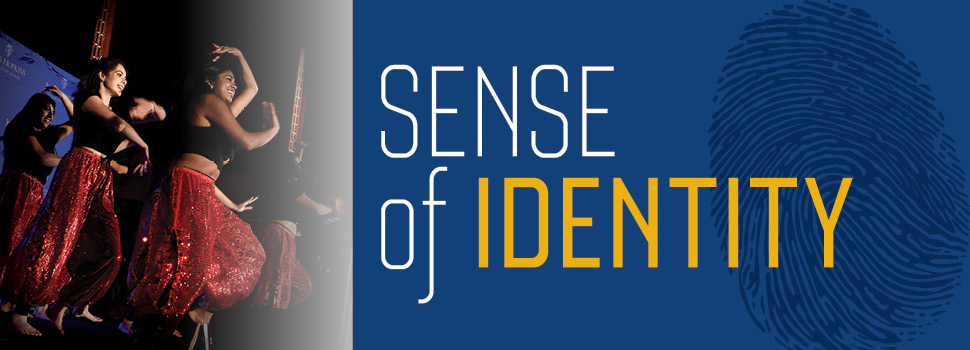
When first-year students come to Homewood, they step into a world of boundless possibility, but they also leave behind their family and community, their cultural customs, and treasured traditions. In the stories that follow, seven Whiting School students share how they were able to maintain, define, and redefine their sense of identity at Johns Hopkins.
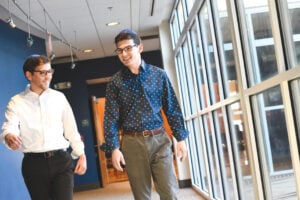
STEVEN DOCTORMAN ‘24, Welcome Squad, JHU Jewish Student Association
A Path to Leadership
Zach Gold, who is studying biomedical engineering, took a gap year between his final year of high school and his first year of college in order to focus on religious growth. That time allowed him to travel to Israel as well as research Jewish student groups at Hopkins. Identifying Hillel ahead of time allowed him to actualize on potential connection, he says. “I came from an Orthodox Jewish household, school, family, and community. Before I came to Hopkins, I was worried about having to toe the line of maintaining my identity in an environment where everyone else was not Orthodox. Finding the Johns Hopkins Hillel group helped me solidify a path for how I identified as a Jew, and even became a path to leadership. I am now the prospective student liaison, the Jewish Learning Chair on the Hillel Student Board, and help facilitate weekly Shabbat services. Being part of this group helps us build connections and community, which helps us strengthen our sense of identity,” says Gold.
‘It’s Part of Who I Am’
Steven Doctorman, who is studying chemical and biomolecular engineering, says he was “disconnected from faith” when he came to Johns Hopkins as a first-year student. “I didn’t feel like a practicing Jew when I first arrived at Hopkins. During my first year, we were remote because of COVID, and I struggled to find students to relate to or with whom I identified,” he says. But then he had coffee with a senior in the Hillel Welcome Squad, a program now managed by Rachel Gordon, an Israel Engagement Professional with Johns Hopkins Hillel.
“That senior welcomed me to campus and consistently invited me to events and religious services. I realized there was a community for me after all. I am now part of the Welcome Squad, to welcome first-year students who identify as Jewish on their college application. This helped me become a meaningful part of the community,” says Doctorman. “Now most of my closest friends are Jewish; it is part of who I am. The Welcome Squad changed the course of my college life, and being part of it provides me with the opportunity to do the same for others, to provide access to a community.”
‘A Family Here on Campus’
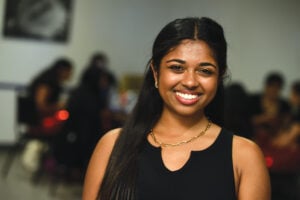
Sneha Kamada, who is studying biomedical engineering, is one of the captains of JHU JOSH, an all-female and nonbinary fusion group incorporating Indian classical dance styles (Bharatanatyam, Kathak)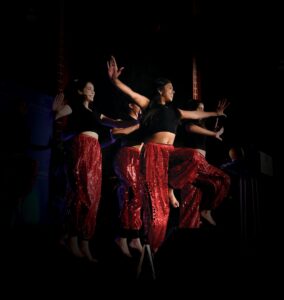 , hip-hop, South Indian Kuthu, and occasionally Bhangra, Raas, and Latin styles. (The word josh comes from the Hindi language and means energy.)
, hip-hop, South Indian Kuthu, and occasionally Bhangra, Raas, and Latin styles. (The word josh comes from the Hindi language and means energy.)
As a multicultural group, participants consciously aim to reflect the unique cultural identities of their members and to provide an inclusive space for members to express themselves through dance. “I grew up in a small town where I was the only Indian girl in my year [at school],” says Kamada. “I had no cultural outlet, which is what I was looking for when I came to Hopkins. This group allows me to express my culture through choreography and to have a family here on campus. When we perform at cultural events, it feels much less intimidating to do so together,” she says.
‘A Safe Space’
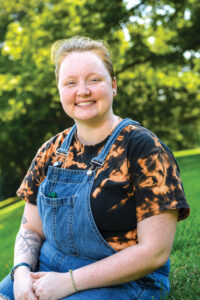
Em Ambrosius, who is studying applied math and chemistry, became a board member of the Diverse Sexuality and Gender Alliance in the spring of their first year at Hopkins. “I learned about DSAGA during a JHU orientation event. We struggled with membership during COVID, but I am excited for in-person meetings this year,” says Ambrosius. “One of the best parts of our meetings is how we go around and introduce ourselves at the beginning of every meeting. If you’re trying out new pronouns or experimenting with a different name, it doesn’t have to be through some big announcement that you change the way people refer to you; you can just introduce yourself and try it out,” says Ambrosius, who uses they/them pronouns.
“Membership is confidential, so students don’t have to worry about revealing their identity if they’re not out yet. For me, it’s a safe space where I can totally be myself, within my nonbinary identity, and everyone’s okay with that,” they say. DSAGA caters mostly to queer students but is also welcoming of their friends and allies. The group’s main goal is to foster a sense of community, to provide a space for conversations and connections.
Empowering Other Women
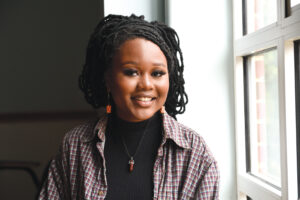
Michelle Mokaya, who is studying chemical and biomolecular engineering, has been a member of Knotty By Nature since her first year at Hopkins.
A Baltimore native, she grew up in predominantly Black spaces and regarded Hopkins as a predominantly white institution. “Coming to Hopkins was a culture shock, and I wasn’t sure how I was going to navigate. I purposefully put myself in Black affinity spaces so I could find a sense of community. At Whiting, especially as a Black female, there are not a lot of people who look like me. Being part of KBN instilled confidence and made me feel like I belong,” says Mokaya.
KBN is a natural hair club that focuses on the empowerment of natural hair among the Black community. “Knotty By Nature empowers others to talk about the politics associated with natural hair—as a form of identity or culture. General pop culture does not regard natural hair as a beauty standard. It’s seen as ‘unkempt.’ We want to change the narrative,” she says.
The Black hair experience isn’t exclusive to natural hair; it also includes protective styling such as braids, wigs, and even includes those who have lost their hair. “We understand that people have different needs and
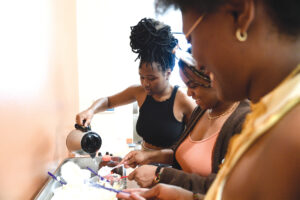
night to help students create their own hair
care products.
circumstances, so we want KBN to be a safe space no matter what hair journey someone is in. You could have natural hair, be in a transitioning phase, or still use relaxers or texturizers,” she explains. Wearing a wig or braiding hair with extensions are popular hairstyles for Black women, which provides protection for hair while it is growing out to avoid breakage, says Mokaya.
KBN holds community events to educate city students about natural hair care and to introduce new Hopkins students to local hair care resources. “I always want to make sure I am involved with groups that continue to cultivate a positive Black experience at JHU,” she says. “My friends and I have been active in these Black affinity groups since our freshman year.”
‘I Never Thought of Myself as Super Cuban’
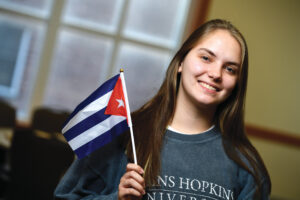
Cristina De Jong, who is studying materials science, has been a member of the Cuban American Undergraduate Students Association since her first year at Hopkins when a fellow sorority sister exclaimed, “Hey, girl—you’re Cuban. You have to come to CAUSA!”
“I never thought of myself as super Cuban,” says De Jong. “I’m not from Miami; I don’t speak Spanish that well; don’t know slang; my mom is Cuban, but my dad is not. I didn’t feel very well connected to my culture before coming to Hopkins, but this group has helped me reconnect to that part of my identity,” says De Jong.
“In CAUSA, I get to meet people with the same experience with culture that is common to all of us,” she says. Especially after the COVID-19 disruption, she is excited to be back to in-person events. “So much of the draw of our membership is offering a physical community, and often with food,” she says.
“I am most excited about our upcoming domino tournament. We actually started planning it a few years ago and are finally able to have it,” she says. 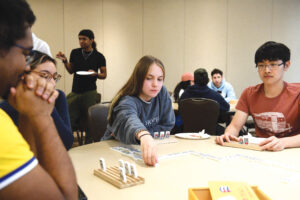 “Playing dominoes is a well-known part of our culture. You see all the old guys in the park playing it. And there will be prizes. I am hoping we can have empanadas.” CAUSA co-hosted the tournament with the Puerto Rican Student Association since playing dominoes is also inherent to their culture.
“Playing dominoes is a well-known part of our culture. You see all the old guys in the park playing it. And there will be prizes. I am hoping we can have empanadas.” CAUSA co-hosted the tournament with the Puerto Rican Student Association since playing dominoes is also inherent to their culture.
Finding What He Left Back Home
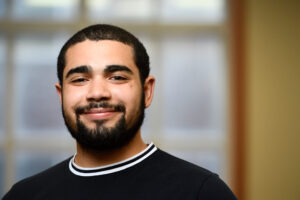
Allan Raposo, who is studying computer science, joined the Society of Hispanic Professional Engineers-JHU as a first-year student. “I had a difficult time adjusting when I first came to Hopkins, because initially it was hard to find people to connect with,” he says. 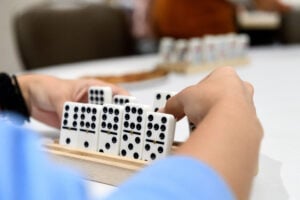 “I went to my first meeting because they were offering free food—tacos. Finding SHPE-JHU allowed me to not only understand other Hispanic cultures, but it made it possible for me to feel I had found what I had left back home.” The JHU Society of Hispanic Professional Engineers often holds social events at local Hispanic restaurants and partners with other student groups such as the Cuban American Undergraduate Students Association with whom they recently held a domino tournament.
“I went to my first meeting because they were offering free food—tacos. Finding SHPE-JHU allowed me to not only understand other Hispanic cultures, but it made it possible for me to feel I had found what I had left back home.” The JHU Society of Hispanic Professional Engineers often holds social events at local Hispanic restaurants and partners with other student groups such as the Cuban American Undergraduate Students Association with whom they recently held a domino tournament.




